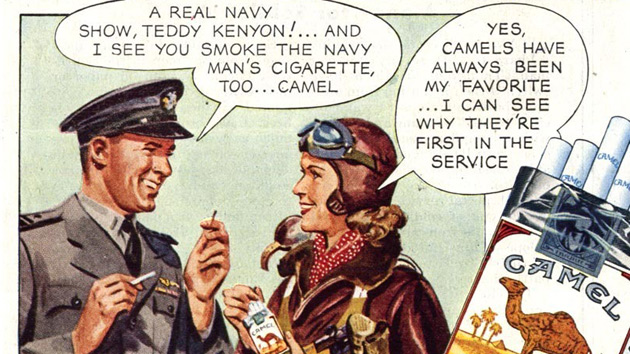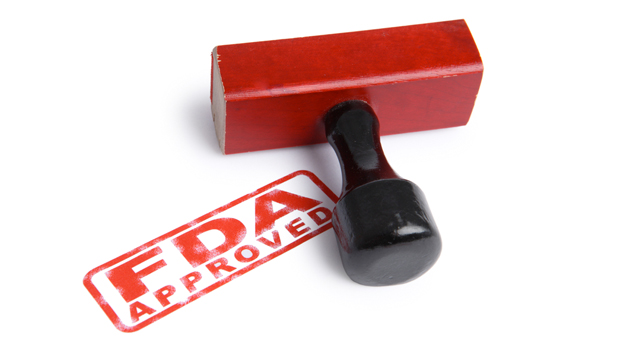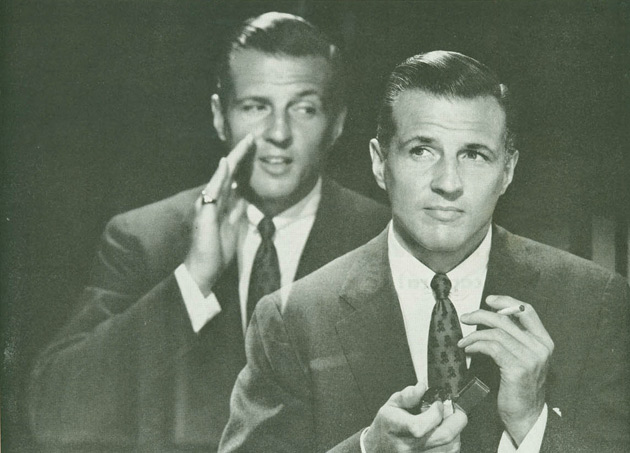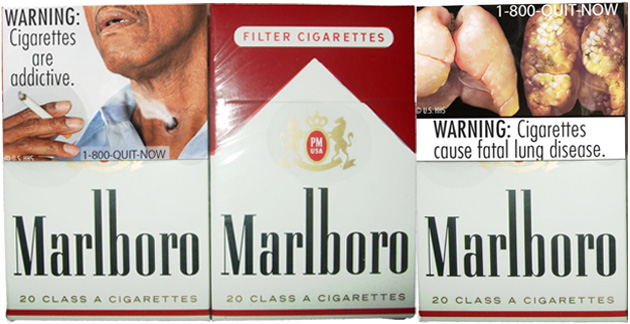
Here's what Marlboros might look like with the warning labels the FDA tried to impose. Photoillustration by David LaFontaine/FairWarning
Talk about luck.
Back in 2009, Congress passed landmark legislation directing the US Food and Drug Administration to regulate tobacco products, which according to the Centers for Disease Control and Prevention kill at least 480,000 Americans each year—more than were killed in battle in all of our foreign wars combined. Among the agency’s early moves was a ban on candy- and fruit-flavored cigarettes, which were assumed to attract children.
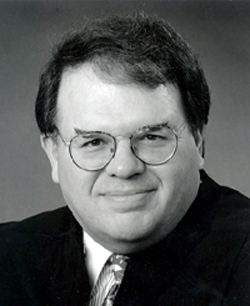
Over the past five years, however, cigarette and e-cigarette companies have filed three major lawsuits against the Food and Drug Administration to halt the imposition of rules intended to make their products less appealing to consumers—and less accessible to kids.
The three cases, which involved, among other things, graphic warning labels, FDA oversight of e-cigarettes, and the use of menthol, were all decided in the industry’s favor by Richard J. Leon, a US District Court judge in Washington, DC, whose rulings have demonstrated concern about government overreach and a tone of deep skepticism toward the FDA’s legal positions. “Please! This conclusion defies common sense,” he wrote, dismissing one of the agency’s arguments.
Given how cases are normally assigned, the fact that Leon was assigned to all three is extraordinary—and extraordinarily good luck for the industry, which currently, for example, remains free of federal restrictions on selling candy-flavored e-cigarettes to children.
How extraordinary? Well, the District Court assigns cases randomly among its regular judges, plus several senior judges with reduced caseloads. According to the court, there were 13 regular judges on hand when two of the cases were filed, and 11 regular judges available when the third was filed. The odds of the cases being randomly assigned to any one judge—1 in 13, 1 in 13, and 1 in 11*—put the chance of a single judge drawing all three FDA cases at 1 in 1,859. With senior judges in the draw, the odds would be even more remote.
Just an unlikely coincidence, court officials say. Nothing more. It would be “indefensible,” said Greg Hughes, the court’s chief deputy clerk for operations, for anyone to bend the assignment rules. The situation “does stretch the bounds of credulity,” he acknowledged, but the complaints were indeed randomly assigned. “That’s what the system’s telling me, and I have to put faith in the system.”
The court does have a “related case” process: The filing lawyer is supposed to inform the court when the case in question is closely related to another case under the court’s jurisdiction. Also, a judge who is randomly assigned a case may request its transfer to a colleague who has handled a very similar case in the past. But court officials told me that neither of those things happened with the FDA cases, and my review of the docket supports that.
Leon joined the court in 2002 after being nominated by President George W. Bush. He is considered something of a maverick conservative, and has come down hard on federal agencies in other cases. In December 2013, for instance, he ruled that the National Security Agency’s bulk collection of phone records of United States citizens is probably unconstitutional. It’s unclear whether another judge would have ruled differently in the FDA cases—two of which have been held up on appeal. (An appeal of the third case is pending.)
Leon declined to be interviewed for this story, as did officials with the FDA and Justice Department—which represents the agency in court. Tobacco industry lawyers either did not return my calls or declined to be interviewed.
But the tobacco control advocates I reached were somewhat incredulous. It seems “very, very strange that somebody who has demonstrated a sustained hostility to the federal regulation of tobacco products keeps getting assigned to these cases,” said Richard Daynard, a Northeastern University law professor and chairman of the Boston-based Tobacco Products Liability Project. “It certainly leaves one wondering what is going on.”
Matthew L. Myers, president of the Campaign for Tobacco-Free Kids, told me that the impact of these rulings has been “enormous.” Leon “has fundamentally altered the FDA’s authority and ability to carry out its congressional mandate,” he said. “It has had a direct effect on what has happened with e-cigarettes, [and] the fact that the United States still has among the weakest warning labels in the entire world.”
“But,” Myers added, “there is no evidence of wrongdoing. You can’t point to anything. I wish I could.”
Legal authorities had to agree. “The odds are long,” said Andrew Bradt, an assistant professor and expert on litigation procedure at the University of California-Berkeley School of Law, “but I would have no basis for saying there’s any shenanigans going on.”
Alan B. Morrison, a George Washington University law professor with extensive litigation experience in the DC District Court, concurred that the odds were “quite astounding.” But given the outcome of the appeals to date, he doubts anything happened that “is evil or malicious or affecting outcome.”
Leon’s decisions have stymied federal oversight in the following areas:
E-cigarettes: In 2009, the FDA tried to halt a shipment of e-cigarettes into the United States on the grounds that the products—which produce nicotine vapor without burning tobacco—were unapproved drug delivery devices. E-cigarette marketers sued the agency. In January, 2010, Judge Leon issued an injunction saying the FDA lacked authority to regulate e-cigarettes as drug delivery devices because the marketers weren’t making therapeutic claims. The ruling was affirmed on appeal.
Almost five years later, e-cigarettes (along with similar devices called “vape” pens or hookah pens that can be used to ingest nicotine) are still exempt from FDA oversight. Although the vapors e-cigarettes produce appear to be less harmful than tobacco smoke, nicotine is extremely addictive. Health officials fear kids who get hooked using the devices may well graduate to smoking.
Indeed, according to a recent CDC study, more than a quarter-million middle and high school students who had never smoked said they had used e-cigarettes in 2013. And because the devices are unregulated, they aren’t bound by federal age limits, bans on kid-friendly flavorings, or advertising restrictions. In April, the FDA finally issued a proposed rule that would give it the authority to regulate e-cigarettes as tobacco products (as opposed to drug delivery devices), but that rule won’t become final until next year at the earliest.
Graphic warning labels: The 2009 anti-smoking legislation directed the FDA to create bold pictorial warnings for cigarette packs that would replace the small text warnings that have been unchanged since the 1980s. Seventy-four countries and territories around the world require such graphic warnings, according to survey data from the Canadian Cancer Society, but the United States, with the world’s biggest tobacco control program, still doesn’t have them.
In June, 2011, the FDA ordered the use of nine rotating warnings designed to cover 50 percent of cigarette packages. The images included things like diseased lungs and a cadaver on an autopsy table.
Five tobacco companies, including RJ Reynolds and Lorillard—the second- and third-leading cigarette makers—filed a lawsuit claiming the mandate violated their First Amendment rights. Judge Leon sided with the companies, ruling that the labels were “more about shocking and repelling than warning,” and amounted to an “impermissible expropriation of a company’s advertising space for Government advocacy.” A federal appeals court upheld the decision in August 2012.
The FDA has gone back to the drawing board to develop new warnings that will pass legal muster. But officials aren’t saying when they will be proposed.
Menthol cigarettes: The 2009 tobacco control act also directed the FDA to create an expert panel—the Tobacco Products Scientific Advisory Committee to study whether menthol cigarettes pose more of a risk to public health than nonmenthol brands. In a July 2011 report, the panel concluded that menthol, which anesthetizes the throat against the harshness of the smoke, likely makes it easier for teens and young adults to take up smoking.
Lorillard and RJ Reynolds sued to invalidate the report, complaining that several panel members had conflicts of interest because they had served as consultants to pharmaceutical companies developing smoking cessation products and had served as witnesses in anti-tobacco lawsuits.
This July, Judge Leon ruled that panel members Neal Benowitz and Jack Henningfield, both renowned addiction experts, and Dr. Jonathan Samet, an editor on several Surgeon General reports, had conflicts that “fatally tainted” the panel and the menthol report. He ordered the FDA to reorganize the committee, and forbade it from considering the panel’s findings. The agency has filed a notice of appeal.
Correction: When first published, this story reported the number of regular judges at the times the cases were assigned as 13, 13, and 9. That 9 should have been an 11. The final odds figure is correct.
A version of this story was published concurrently by FairWarning.org, a nonprofit investigative news organization focused on public health, safety, and environmental issues.
